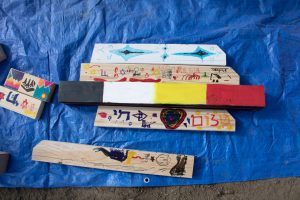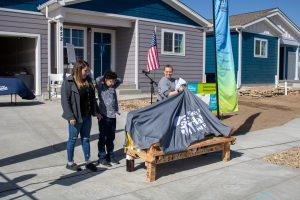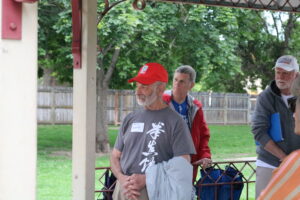This is Part 2 of a 7-part series featuring Pikes Peak Habitat Interfaith Build for Unity subcommittee members, who discuss their faith community’s involvement in creating an interfaith unity bench for 3rd IBU homeowner Jessica. Read Part I, an interview with Jeff Mawhirter from Christ City Church, who assembled the bench.
Jeff Ader is president of Temple Beit Torah and chair of the Pikes Peak Habitat IBU subcommittee. He says,
 Temple Beit Torah was inspired to participate in the Unity Bench project due to our fundamental belief that all belief systems share more commonalities than differences. We saw the build and the bench as a tangible expression of this shared humanity and unity among diverse faith communities.
Temple Beit Torah was inspired to participate in the Unity Bench project due to our fundamental belief that all belief systems share more commonalities than differences. We saw the build and the bench as a tangible expression of this shared humanity and unity among diverse faith communities.
Contributing to the bench alongside other faith groups was a deeply enriching experience, fostering dialogue, understanding, and collaboration in pursuit of a common goal.
In our faith community, we engaged our religious school students to create the artwork for the bench. This decision aimed to involve our young people in Habitat for Humanity’s mission and to foster interfaith engagement. It was also a meaningful way for our community to contribute to the larger community while nurturing a sense of responsibility and belonging among our youth.
“Collaborating with diverse faith groups to build affordable housing or create meaningful communal projects like this bench demonstrates our collective care and commitment to making a positive impact in the world.”

The designs predominantly featured the Star of David, a symbol deeply significant in the Jewish faith. Additionally, the Hebrew word “Chai,” meaning “Life,” was prominent, reflecting the core values and aspirations of our tradition. The inclusion of a Jewish prayer for family underscored the importance of community and connection within our faith tradition.
I want Jessica and our readers to recognize that regardless of their faith or lack thereof, fundamental human desires for security, respect, and self-respect are universal. Collaborating with diverse faith groups to build affordable housing or create meaningful communal projects like this bench demonstrates our collective care and commitment to making a positive impact in the world.

It’s also crucial to emphasize to our young people the importance of action in line with the philosophy of Tikkun Olam, or “repairing the world.” Through initiatives like this, we impart essential values and empower the next generation to be agents of positive change.
Read more about the IBU bench from Pikes Peak Habitat’s spring print newsletter!

